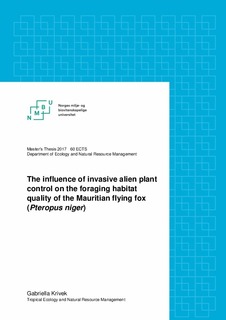| dc.contributor.advisor | Haugaasen, Torbjørn | |
| dc.contributor.author | Krivek, Gabriella | |
| dc.coverage.spatial | Mauritius | nb_NO |
| dc.date.accessioned | 2017-10-20T11:27:42Z | |
| dc.date.available | 2017-10-20T11:27:42Z | |
| dc.date.issued | 2017 | |
| dc.identifier.uri | http://hdl.handle.net/11250/2461269 | |
| dc.description.abstract | The last surviving Mauritian fruit bat species, Pteropus niger, although endangered, provides essential seed dispersal and pollination services for the threatened native flora. However, their foraging habitats in native forest remnants are dominated by alien invasive plants and are inhabited by invasive alien animals like long-tailed macaques. Competition for food resources and a decrease of native fruiting trees appear to force fruit bats to top up their diet with cultivated fruits. Consequently, a rapidly escalating conflict with local farmers resulted in a mass cull initiated by the Mauritian government that decimated around 50% of the fruit bat population. Here, I investigate the impact of invasive alien plant control on the foraging habitat quality of fruit bats, by quantifying fruit production and fruit bat foraging intensity in weeded and non-weeded forest areas using ground quadrats. Moreover, I examine how native tree traits and fruit characteristics affect tree and fruit selection of flying foxes and long-tailed macaques. Weeding significantly increased both native fruit production and fruit bat foraging intensity. Fruit bats preferred to forage in weeded areas on tall trees with a large crown. In addition, fruit bats preferred large and ripe fruits, while long-tailed macaques more often used small unripe fruits. Peak of native fruit use by macaques coincided with lower use by fruit bats, suggesting resource competition. The results suggest that weeded forests provide a better foraging habitat for P. niger than non-weeded areas, and emphasize the importance of weeding for the recovery of native plant communities and their associated biodiversity. I conclude that weeding and controlling of the introduced long-tailed macaque population may be solutions to mitigate the current human-wildlife conflict. In the long term, failure to improve native foraging habitats of fruit bats is likely to increase their extinction risk on Mauritius. | nb_NO |
| dc.language.iso | eng | nb_NO |
| dc.publisher | Norwegian University of Life Sciences, Ås | nb_NO |
| dc.rights | Attribution-NonCommercial-NoDerivatives 4.0 Internasjonal | * |
| dc.rights.uri | http://creativecommons.org/licenses/by-nc-nd/4.0/deed.no | * |
| dc.subject | invasive alien plant, Pteropus, fruit bat, weeding | nb_NO |
| dc.title | The influence of invasive alien plant control on the foraging habitat quality of the Mauritian flying fox (Pteropus niger) | nb_NO |
| dc.type | Master thesis | nb_NO |
| dc.subject.nsi | VDP::Mathematics and natural science: 400::Zoology and botany: 480::Ecology: 488 | nb_NO |
| dc.source.pagenumber | 33 | nb_NO |
| dc.description.localcode | M-ECOL | nb_NO |

